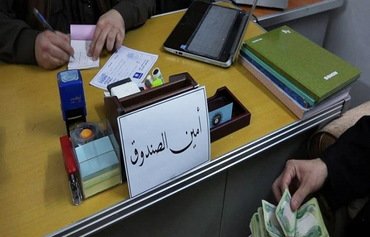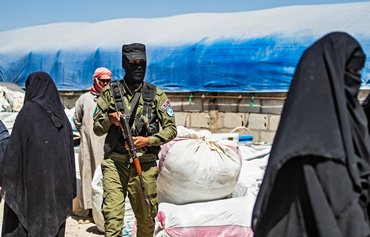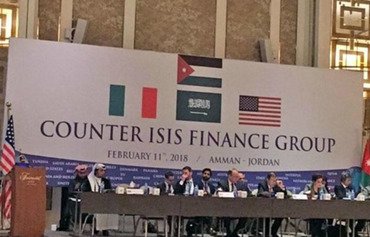The US Treasury on November 18th designated several companies and individuals operating in Syria, Turkey, and across the Gulf and Europe for providing critical financial and logistical support to the "Islamic State of Iraq and Syria" (ISIS).
"Following the highly successful operation against [Abu Bakr] al-Baghdadi, the Trump Administration is resolved to completely destroy ISIS's remaining network of terror cells," said Treasury Secretary Steven Mnuchin.
"The Treasury Department contributes to this effort in several ways, including by degrading ISIS's ability to recruit and arm fighters globally by stamping out its financial footholds," he said.
Terrorism is curbed through military pressure and the severing of the extremists' financial revenue streams, al-Mustansiriya University political science teacher Issam al-Fayli told Diyaruna.
The US Treasury's role in cutting off the sources of funding for terror groups has been "vital and indispensable to joint international efforts to fight terrorism", he said.
The sanctions imposed by the Treasury on networks and individuals who support ISIS have helped curb the group's activities not only in Iraq and Syria, but in various countries around the world, he added.
Sanctions hamper terror funding
The newly announced sanctions affect companies that transfer funds for the benefit of ISIS fighters, al-Fayli said.
Among them is Tawasul company, whose office in Harim, Syria, was used by an ISIS financial facilitator to transfer funds to the group as of mid-2018, according to the Treasury.
As of 2018, ISIS allegedly had used Tawasul, as well as multiple other companies in Syria and Western Europe, to transfer money among ISIS fighters.
Sanctions also include Sahloul money exchange company which, in late 2016, facilitated the transfer of foreign donations to ISIS’s then-headquarters in Mosul, Iraq.
Additionally, Sahloul transferred thousands of dollars to ISIS operatives in Turkey in 2016.
The sanctions list also includes terrorist-financing parties operating under the guise of humanitarian organisations, said al-Fayli.
"This reflects the distinct intelligence work that has led to exposing those parties that hide under the guise of charity to facilitate money transfers to terrorists," he said.
Among these is Sayed Habib Ahmad Khan, the Kuwait-based director of the Nejaat Social Welfare Organisation, also sanctioned by the US Treasury.
Nejaat was used as a cover company to facilitate the transfer of funds and support the activities of ISIS-Khorasan.
Nejaat collected donations on behalf of ISIS-K from individuals in Qatar, the UAE, Iraq, and other Middle Eastern countries. Money was then transferred from the Gulf to Asia -- via the banking system -- where an ISIS-K co-ordinator would collect the transferred funds.
US, Iraqi partnership
"The sanctions prohibit these [ISIS] supporters' entry into the global financial system by preventing all companies and banks from dealing with them," al-Fayli said.
These restrictions "cripple the terrorists' ability to collect money and use it to arm themselves, recruit new fighters and carry out devastating attacks", he said.
Al-Fayli praised the security partnership between Iraq and the US, noting that "the uncovering of many of the terrorists' sources of funding is the outcome of that partnership, which continues through intelligence co-ordination".
"Thanks to US military support, Iraq today has an important database on ISIS remnants," he said.
Any information obtained through records and documents found at ISIS hideouts is shared as part of that partnership and used to track the terror networks' funding domestically and abroad, said al-Fayli.

![A merchant arranges stacks of Syrian pounds at a market in the city of Qamishli in north-east Syria on September 10th. The US Treasury on November 18th sanctioned individuals and companies operating in Syria, Turkey, and across the Gulf and Europe for providing financial assistance to ISIS. [Delil Souleiman/AFP]](/cnmi_di/images/2019/11/19/20989-Syria-Qamishli-currency-600_384.jpg)






